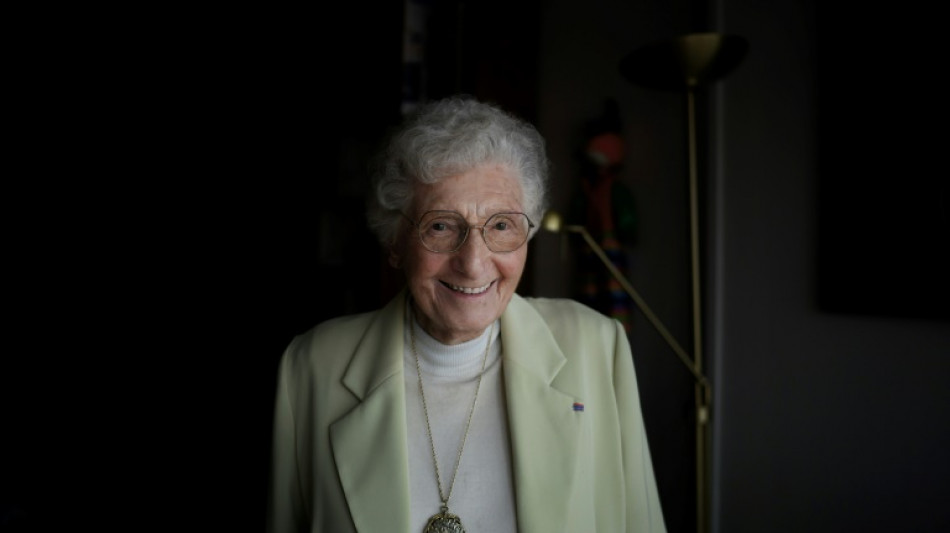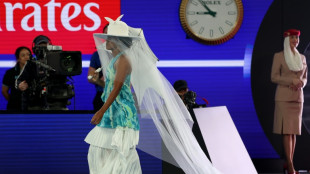
-
 Scotland boss Townsend picks veterans Gray and Cherry for Six Nations
Scotland boss Townsend picks veterans Gray and Cherry for Six Nations
-
Record try-scorer Penaud faces French axe for Six Nations

-
 UK approves plans for Chinese mega-embassy in London
UK approves plans for Chinese mega-embassy in London
-
Rosenior keen to build winning ties with 'world-class' Fernandez

-
 Dakar delights in Senegal parade honouring AFCON champions
Dakar delights in Senegal parade honouring AFCON champions
-
UK comedian Russell Brand in court on two new rape charges

-
 France set to face New Zealand with second-string squad
France set to face New Zealand with second-string squad
-
Eyeing China, EU moves to ban 'high-risk' foreign suppliers from telecoms networks

-
 Struggling Suryakumar will not adapt style to find form before T20 World Cup
Struggling Suryakumar will not adapt style to find form before T20 World Cup
-
World stocks sink, gold hits high on escalating trade war fears

-
 Easier said than done for US to apply tariffs on single EU states
Easier said than done for US to apply tariffs on single EU states
-
Canada military models response to US invasion: report

-
 Salah returns to Liverpool training after AFCON
Salah returns to Liverpool training after AFCON
-
Milan menswear shows add bling with brooches

-
 Scotland recall Gray, Cherry for Six Nations
Scotland recall Gray, Cherry for Six Nations
-
Scheib storms to Kronplatz giant slalom victory as Brignone impresses in World Cup return

-
 Chagos Islands: international dispute and human drama
Chagos Islands: international dispute and human drama
-
Thousands of farmers protest EU, Mercosur trade deal ahead of vote

-
 Men's Fashion Week kicks off in Paris with tributes for Valentino
Men's Fashion Week kicks off in Paris with tributes for Valentino
-
Lake named as captain as Wales unveil Six Nations squad

-
 Royals visit deadly train crash site as Spain mourns
Royals visit deadly train crash site as Spain mourns
-
Police, pro-Kurd protesters clash at Turkey border with Syria

-
 Thai forces razed Cambodian homes on border: rights group
Thai forces razed Cambodian homes on border: rights group
-
Jellyfish-inspired Osaka battles into Australian Open round two

-
 Valentino taught us to respect women, says partner
Valentino taught us to respect women, says partner
-
Australia stiffens hate crime, gun laws after Bondi attack

-
 Mercedes chief designer Owen to leave F1 team
Mercedes chief designer Owen to leave F1 team
-
Trump unloads on allies as Davos showdown looms

-
 Moscow revels in Trump's Greenland plans but keeps concerns quiet
Moscow revels in Trump's Greenland plans but keeps concerns quiet
-
Global tourism hit new record level in 2025: UN

-
 Senegal poised to party with parade honouring AFCON champs
Senegal poised to party with parade honouring AFCON champs
-
Osaka emerges for Melbourne opener under hat, veil and parasol

-
 Dogsled diplomacy in Greenland proves elusive for US
Dogsled diplomacy in Greenland proves elusive for US
-
Almost half of Kyiv without heat, power, after Russian attack

-
 EU vows 'unflinching' response to Trump's Greenland gambit
EU vows 'unflinching' response to Trump's Greenland gambit
-
Osaka steals show at Australian Open as Sinner strolls through

-
 Brignone impresses in first run of Kronplatz giant slalom in World Cup comeback
Brignone impresses in first run of Kronplatz giant slalom in World Cup comeback
-
Osaka emerges for Melbourne opener under white hat and umbrella

-
 Malawi suffers as US aid cuts cripple healthcare
Malawi suffers as US aid cuts cripple healthcare
-
Bessent says Europe dumping US debt over Greenland would 'defy logic'

-
 Freeze, please! China's winter swimmers take the plunge
Freeze, please! China's winter swimmers take the plunge
-
Talks between Damascus, Kurdish-led forces 'collapse': Kurdish official to AFP

-
 In-form Bencic makes light work of Boulter at Australian Open
In-form Bencic makes light work of Boulter at Australian Open
-
Spain mourns as train disaster toll rises to 41

-
 Sinner into Melbourne round two as opponent retires hurt
Sinner into Melbourne round two as opponent retires hurt
-
Israel begins demolitions at UNRWA headquarters in east Jerusalem

-
 Almost half of Kyiv without heat, power, after Russian attack: govt
Almost half of Kyiv without heat, power, after Russian attack: govt
-
Veteran Monfils exits to standing ovation on Australian Open farewell

-
 Precision-serving former finalist Rybakina powers on in Melbourne
Precision-serving former finalist Rybakina powers on in Melbourne
-
South Korea's women footballers threaten boycott over conditions

| CMSC | -0.66% | 23.325 | $ | |
| NGG | -0.56% | 80.439 | $ | |
| BCC | -1.75% | 84.04 | $ | |
| RYCEF | 0.58% | 17.15 | $ | |
| RIO | -0% | 85.129 | $ | |
| SCS | 0.12% | 16.14 | $ | |
| JRI | -0.04% | 13.695 | $ | |
| VOD | 0.55% | 13.545 | $ | |
| GSK | -0.04% | 48.2 | $ | |
| BCE | 1.13% | 24.415 | $ | |
| BTI | -1.78% | 57.2 | $ | |
| AZN | -4.24% | 90.59 | $ | |
| BP | -0.14% | 35.33 | $ | |
| CMSD | 0.04% | 23.93 | $ | |
| RELX | -2.46% | 40.63 | $ | |
| RBGPF | -1.87% | 82.5 | $ |

Ex-Resistance Olympic torch-bearer still wants to 'change the world'
At the age of 102, Melanie Berger-Volle will carry the Olympic torch as high as she can, despite her fragile shoulder, to champion the values of friendship between peoples that she defended during her time with the French Resistance in the Second World War.
A "woman in the shadows" during the Occupation (1940-1944), Berger-Volle was thrilled to be chosen to carry the torch as it passes through Saint-Etienne on June 22 on its way to Paris for the start of the Olympic Games.
The weight of the torch has been a concern but there was never any question of turning it down.
"I've always loved sport," says the sprightly centenarian who until recently enjoyed an hour's walk a day.
Grandmother of the gymnast Emilie Volle, who took part in the Atlanta Olympics in 1996, she also wants to be a symbol for women "who have fought to play sport like men".
"My ideal has always been to unite the world," she says. "And the Olympics are a wonderful opportunity to get to know other human beings."
- 'Mistreated' -
Born in Austria in 1921 into a Jewish working-class family, Melanie Berger began her activism as a teenager in an extreme left-wing group.
"We were atheists and when I started fighting it wasn't for religious reasons, it was political," she says. "I'm against all dictatorships."
After the annexation of Austria by Nazi Germany in 1938, she left her country, went to Belgium and then arrived in France, in Paris in the spring of 1939, disguised as a boy.
When France went to war later that year, all Austrians, even refugees, were seen as enemies and the authorities put her on a train to a camp near Pau.
At Clermont-Ferrand station, she "jumped out" of the carriage.
She was on her own as the other girls did not dare follow her.
"They weren't political, they didn't know what a camp was," she shrugs.
On the contrary, the young activist was well aware that "when you get a chance, you can't let it go by".
In 1940 after the French surrender to the Nazis, she found herself in Montauban, where a group of Trotskyist militants she had belonged to before the war was beginning to reform.
"With my French-sounding name, I rented a flat in a dilapidated house, and from there we were able to start work."
Discreetly, the group drafted and distributed German-language leaflets aimed at turning Reich soldiers.
In January 1942, however, that all came to an end when the police raided the house and she was arrested and brutally interrogated.
"I was mistreated, men beat me," she says quietly. "The after-effects are still with me. But I'm still here."
She avoided a death penalty and after 13 months in detention in Toulouse, the 22-year-old Berger was transferred to the Baumettes prison in Marseille.
Members of her group, together with the Resistance, prepared her escape.
- 'No' to Nazism -
On October 15, 1943, they came to get her, accompanied by a German soldier who had taken up the cause, while she was in hospital with jaundice.
"I escaped in my nightdress," she laughs.
Once recovered, she campaigned under false identities until the liberation in the summer of 1944.
After the war, she married Lucien Volle, another Resistance fighter who had taken part in the liberation of Le Puy-en-Velay.
Together, the couple began to devote themselves to the work of remembrance.
"We fought constantly to explain. Not what we had done but why we had done it," she says.
She has since been awarded a number of decorations, including the Legion d'Honneur.
"I didn't do much," she says. "But I did say 'no' to Nazism."
Worried again about the return of extremes in Europe, Berger-Volle hopes that young people will in turn be able to defend democracy.
And despite her advanced age, she intends to use the Olympics to get her message across.
"I wanted to change the world," she says with a smile. "And I still want to change it."
P.Keller--VB



